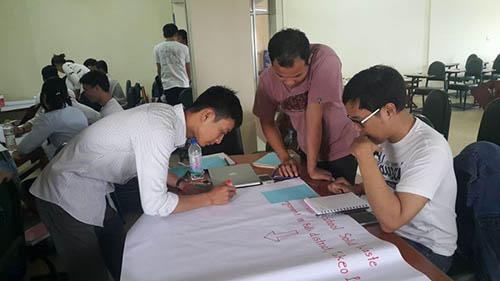A Day in the Life – An EWB Field Professional experience in Phnom Penh – Part 5.
By Lachlan Guthrie – originally published on his blog.
Last week I was given an opportunity to facilitate a workshop to the Center for Sustainable Water’s Young Professional Program. The program is designed for young graduates and over two months give them training and then real world projects to apply what they have learnt. All of this with the aim of making them more creative, analytical and self-sustaining WASH (Water and Sanitation for Health) professionals.
CSW is a knowledge platform that brings together non-professionals and professionals that have common interests in dealing with water-related issues to deliver equitable and sustainable solutions for all. CSW focuses on contributing to sustainable WASH through building human resources, pioneering innovative solutions, and addressing uncertainties in water management in Cambodia.Follow the links to find their facebook.
Me presenting at the workshop
I presented to them on project design and with the help of Virak, founder of CSW, and Melissa and Fatima, two EWB field volunteers, we were able to deliver a successful workshop. By the end, most of the groups had the beginnings of really good project proposals. It was awesome talking to the participants and seeing them learn the skills with openness and excitement. A really great group of young men and women that I’m sure will go on to do great things.
I have run six workshops in total in Cambodia and there are a few things that I have picked up from EWB and my time in here that I think make a successful workshop.
Make it interactive: During the three-hour workshop, over two hours were devoted to interactive exercises where I stopped talking and the attendees were able to work on their project plans. In my experience, a lot of education is one person speaking with a token exercise or two, and this is especially true in Cambodia. I believe (and research shows us that) the majority of a workshop should be exercises so I have a rule that at least two-thirds of the workshop will be exercises.
Make no assumptions: Everyone learns different things in different ways. In one workshop I tried to explain concepts of longitude and latitude. The workshop was going terribly until I realized some attendees didn’t understand what I meant by north and south. Why would they? I’ve never been in a Cambodian primary school so I shouldn’t assume what students learn there.
Be clear with objectives: Why are we doing things? What do we hope to have completed by the end? I think most people accept that it is very important to have workshop objectives, but we often assume that everyone would know what they are because they seem obvious to us. I repeat, make no assumptions.
Plan: Extensively plan the workshop and create a schedule. Make sure you know how long things will go for, make time for exercises, check to see if you are making assumptions, and have the objectives clear in your mind. This will always result in a better workshop.
Be realistic with your own ability: I have realized that my Khmer language and cultural understanding is not good enough to be able to deliver some types of workshops. Even though it will be difficult to use a different delivery method I need to be realistic and accept my limitations.
I will likely run a lot more workshops, so I’ll let you know how they go.


